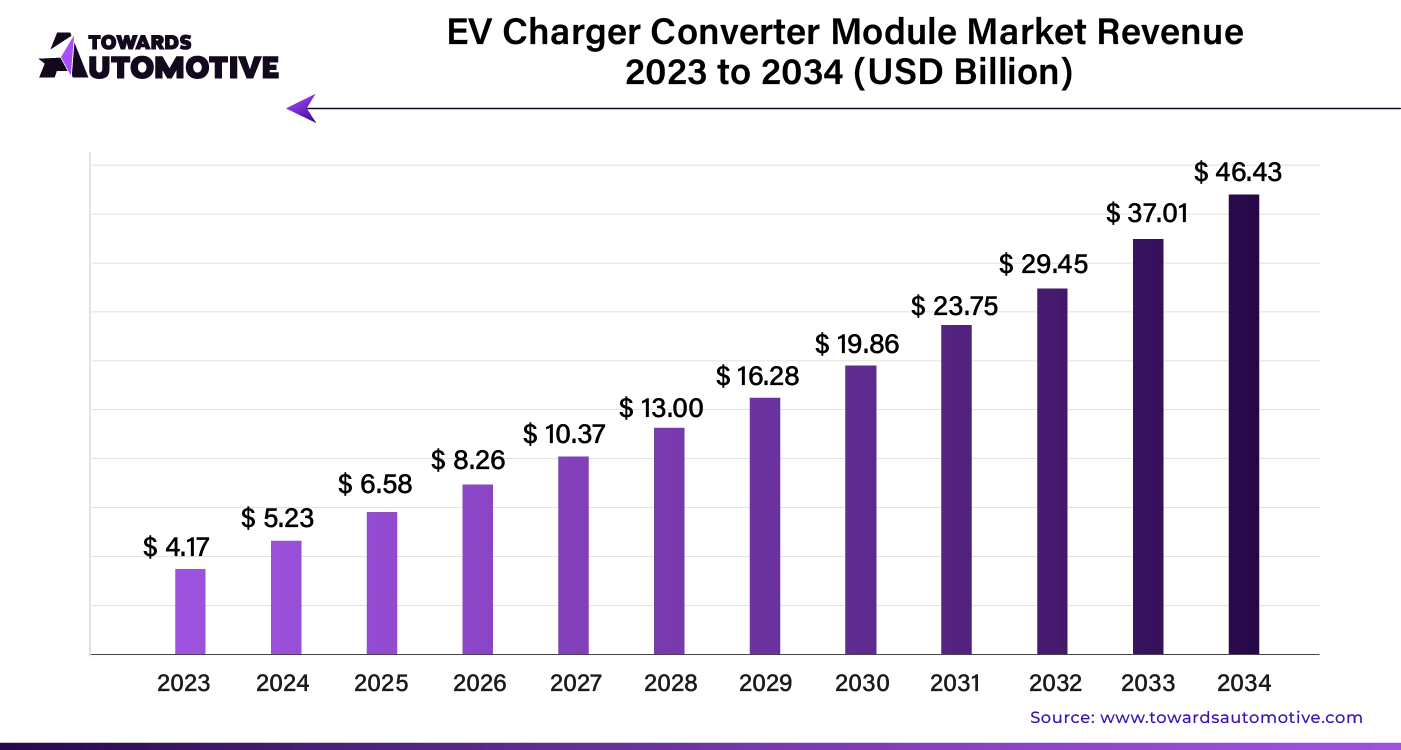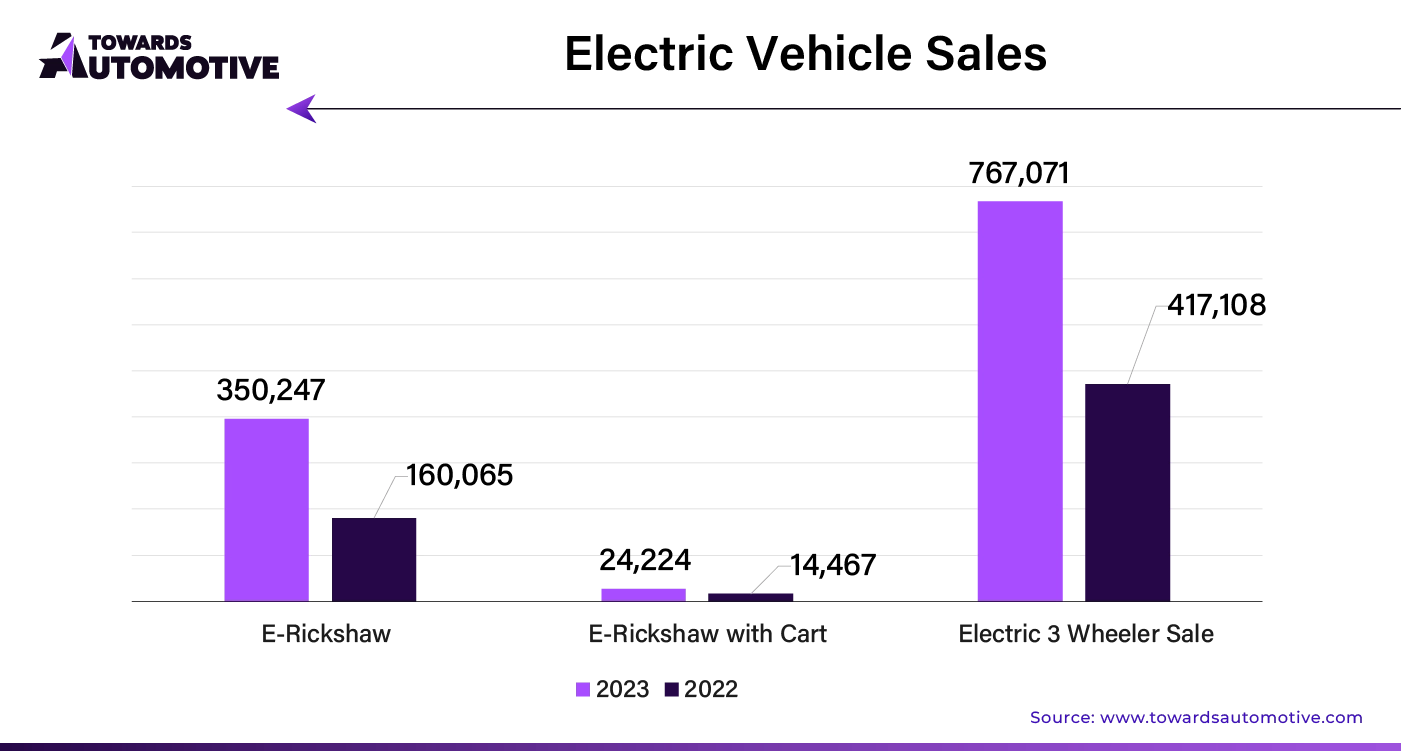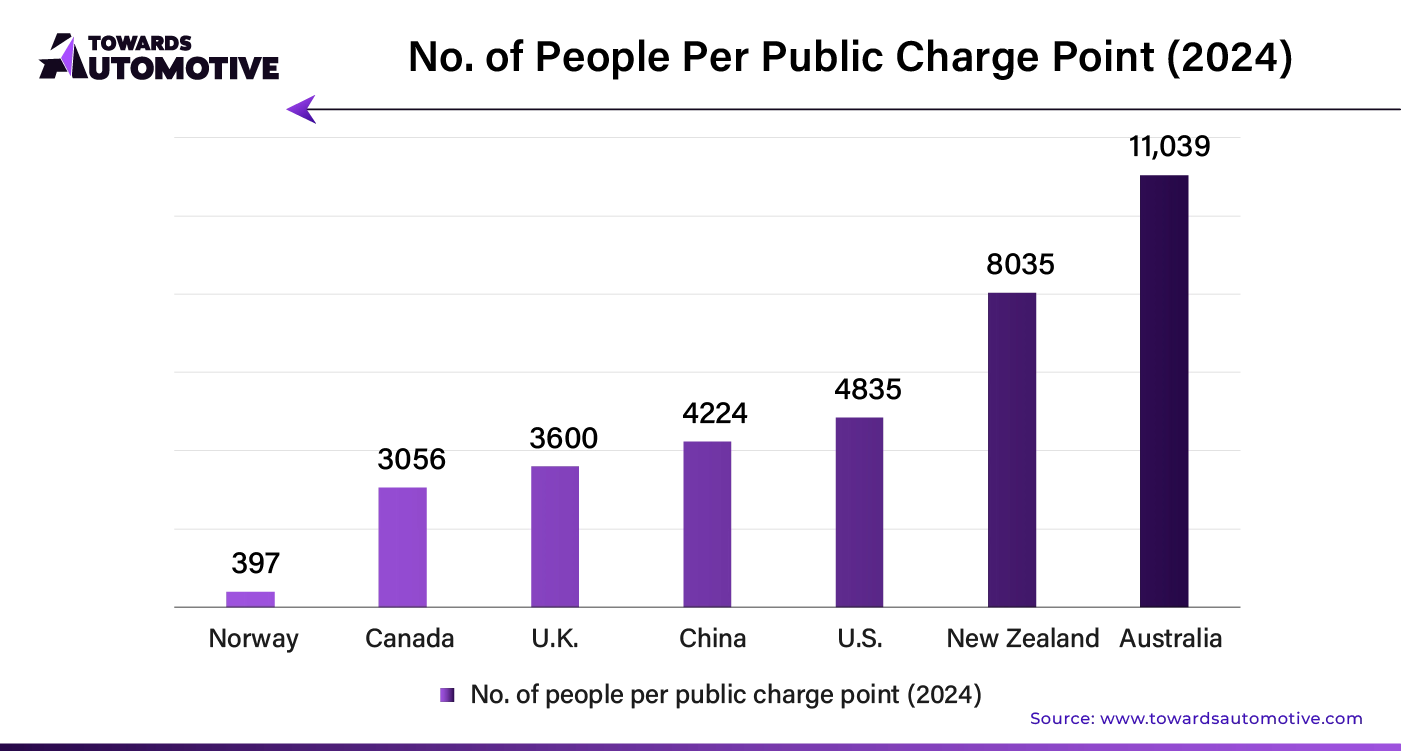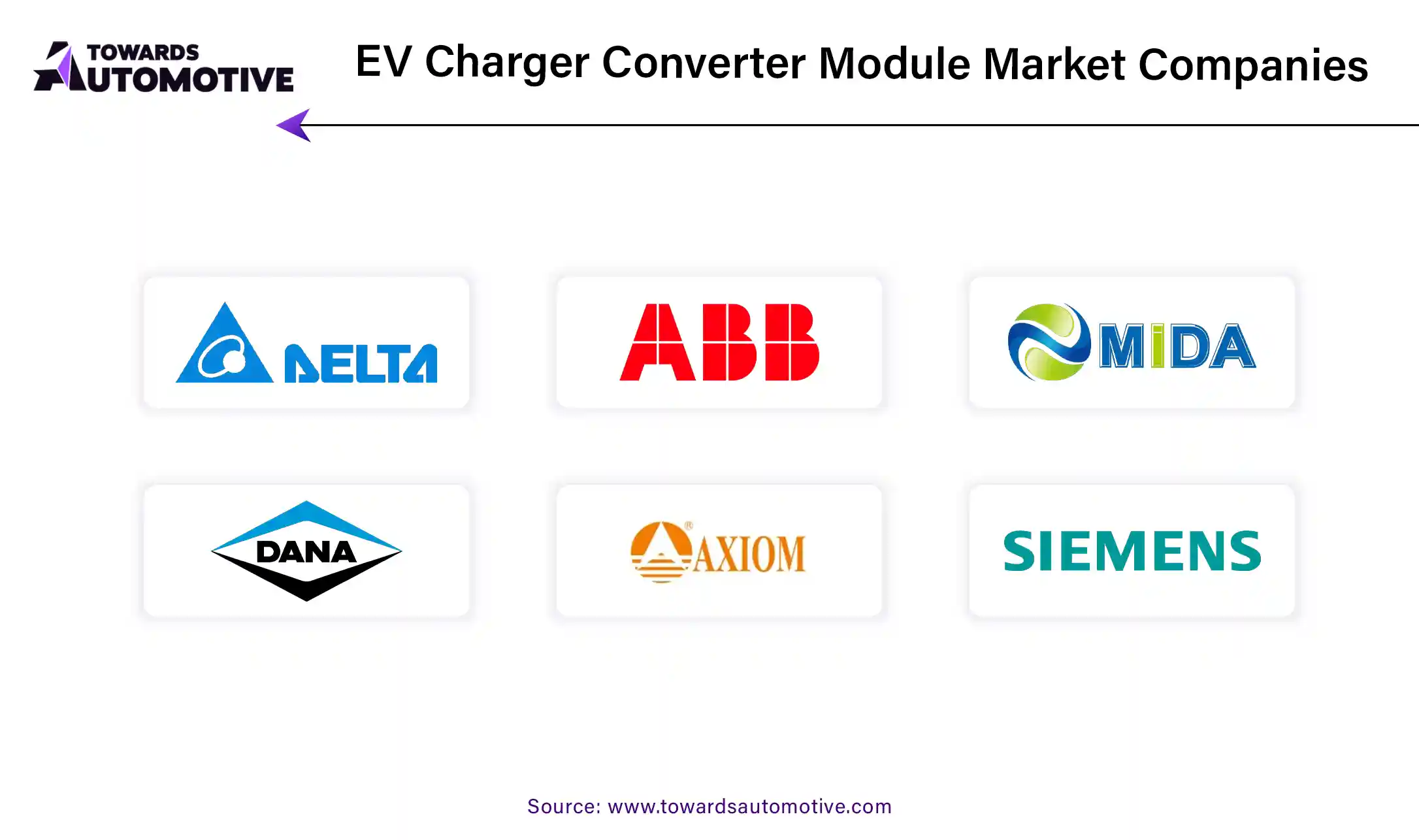April 2025
The EV charger converter module market is expected to grow from USD 6.58 billion in 2025 to USD 46.43 billion by 2034, with a CAGR of 25.47% throughout the forecast period from 2025 to 2034.

Unlock Infinite Advantages: Subscribe to Annual Membership
The EV Charger Converter Module market is expanding rapidly, driven by several crucial factors. The rising adoption of electric vehicles (EVs) as a sustainable and eco-friendly transportation option is a primary catalyst. As more consumers choose EVs, the demand for effective and efficient charging solutions grows.
Government incentives and policies play a significant role in this growth. Various countries are offering substantial subsidies and tax breaks to encourage EV adoption and the development of charging infrastructure. For instance, China’s "New Energy Vehicle" subsidy program, Japan’s "Electric Vehicle Road Map," and South Korea’s "Green New Deal" are prime examples of government initiatives fueling the market.
Technological advancements are also crucial in propelling the market. Innovations in EV technology, such as improvements in battery efficiency and faster charging capabilities, are enhancing the performance of charger converter modules. This technological progress contributes to shorter charging times and increased efficiency.
The growing environmental awareness among consumers further supports market expansion. As people become more conscious of their environmental impact, the demand for sustainable and energy-efficient charging solutions rises. The automotive market valued at USD 4,070.19 billion in 2023, is experiencing growth and is projected to surpass USD 6,678.28 billion by 2032, with a significant CAGR of over 5.66%.
In terms of regional market dynamics, East Asia stands out as a major hub for EV charger converter module production. Countries like China, Japan, and South Korea are at the forefront of technological innovation and infrastructure development. The rapid urbanization in cities such as Beijing, Tokyo, and Seoul is accelerating the need for robust charging networks and sustainable transportation solutions.
DC/DC converters, in particular, are experiencing significant demand due to their direct compatibility with the DC output of EV batteries. This direct compatibility simplifies the charging process and enhances overall efficiency. Compared to AC/DC converters, DC/DC converters offer higher efficiency, faster charging times, and reduced energy consumption. Their role in fast-charging infrastructure is crucial, and their market dominance is expected to grow as the demand for rapid charging solutions increases.

As electric vehicles (EVs) gain traction, the demand for EV charger converter modules is increasing. These essential components efficiently convert electrical currents into usable energy for EV batteries.
The market primarily features two types of converter modules: DC-DC converters and AC/DC converters. The rising need for these modules is expected to drive market growth through 2034.
Converter modules come in various power ratings, catering to different applications, including residential, commercial, and public charging stations. This versatility supports ongoing market expansion.
Factors such as the shift toward e-mobility, government funding, and advancements in charging technology are expected to boost sales. Additionally, countries aiming to cut carbon dioxide emissions and enhance air quality are contributing to the growing demand.
The expanding global electric vehicle market ensures sustained growth for converter modules, driven by the increasing need for robust charging infrastructure.
The EV charger converter module market is poised for substantial growth due to rising environmental concerns and technological advancements in electric vehicles. As more consumers and nations adopt electric vehicles, the demand for charging infrastructure, including converter modules, is set to increase significantly.
Technological innovations in converter modules, such as enhanced power electronics and advanced charging algorithms, will boost charging efficiency and cut down charging times. Additionally, the development of wireless and bidirectional charging technologies will create new market opportunities, aligning with evolving consumer needs and driving further growth in the sector.
Innovations in Fast Charging Technology
Advancements in fast charging technology are a key driver for the growth of the EV charger converter module market. This technology reduces charging times and boosts convenience for electric vehicle (EV) owners. As fast charging solutions become more popular, there is a rising demand for converter modules that support higher charging speeds and power outputs. The development of ultrafast charging stations, offering 350 kW or more, highlights the shift towards quicker and more efficient charging. Innovations in this field will continue to drive the growth of the EV charger converter module market.
Integration of Renewable Energy Sources
The integration of renewable energy sources is crucial for expanding the EV charger converter module market. As the world moves towards sustainable energy, the synergy between electric vehicles and renewable sources like solar and wind power becomes more significant. Converter modules are essential for managing the interface between these renewable sources and EV charging infrastructure. They help reduce carbon emissions and promote sustainability by integrating renewable energy into charging networks. With advancements in smart grid technology enhancing energy management, the demand for converter modules designed for renewable energy integration is expected to rise.
Emergence of V2G Technology
The rise of Vehicle-to-Grid (V2G) technology is another major factor driving the growth of the EV charger converter module market. V2G technology allows electric vehicles to return excess energy to the grid, in addition to consuming energy. Converter modules are vital for enabling this bidirectional power flow, which supports grid stabilization, peak demand management, and potential revenue generation for EV owners. As V2G technology gains traction, the need for converter modules that support this functionality will increase, supported by regulatory backing and successful pilot projects.
Challenges Hindering EV Charger Converter Module Market Growth
Supply chain disruptions significantly impact the EV charger converter module market. Material shortages, transportation issues, and manufacturing delays disrupt production and distribution. The ongoing semiconductor shortage, in particular, hinders the availability of essential components, causing production bottlenecks and extending lead times.
These disruptions delay the deployment of critical charging infrastructure, which is vital for electric vehicle adoption. Automotive manufacturers, facing production cuts and delays due to semiconductor shortages, struggle to supply essential components, including converter modules. As a result, these combined issues threaten the growth of the EV charger converter module market.

The integration of artificial intelligence (AI) into EV charger converter modules is revolutionizing the market, driving rapid growth and innovation. AI enhances these modules by optimizing charging efficiency and improving energy management. Through advanced algorithms and machine learning, AI can predict and adjust charging patterns based on user behavior and grid demand, minimizing energy waste and reducing costs.
AI-powered modules also enable predictive maintenance, identifying potential issues before they occur and ensuring consistent performance. This proactive approach reduces downtime and extends the lifespan of the equipment. Additionally, AI facilitates smart grid interactions, allowing for seamless integration with renewable energy sources and dynamic pricing models.
As a result, the market for AI-integrated EV charger converter modules is expanding, attracting significant investment and fostering technological advancements. Enhanced efficiency, reliability, and user convenience are key drivers behind this growth. Companies that leverage AI in their EV charger solutions are well-positioned to capitalize on the increasing demand for sustainable and efficient electric vehicle infrastructure.
In the EV charger converter module market, an efficient supply chain is crucial for meeting rising demand. The supply chain begins with raw materials, such as semiconductors and magnetic components, sourced from specialized suppliers. These materials are then processed and assembled into converter modules by manufacturers.
Manufacturers play a pivotal role in ensuring quality and consistency, while logistics providers handle the transportation of finished modules to distributors. Timely delivery is essential to maintain the flow of products to various markets. Distributors then supply these modules to end-users, including EV manufacturers and charging station operators.
To address market demands, companies must foster strong relationships with suppliers and invest in technology to streamline operations. Real-time data and advanced forecasting tools help anticipate supply chain disruptions and optimize inventory levels. Additionally, establishing multiple sourcing options for critical components mitigates risks associated with supply shortages.
Overall, a well-managed supply chain enhances market responsiveness, reduces lead times, and supports the growth of the EV charger converter module sector, driving advancements in electric vehicle infrastructure.
The EV Charger Converter Module market thrives on essential components and active contributions from various companies. At its core, the market relies on components such as power semiconductor devices, control units, and thermal management systems. Power semiconductor devices, including MOSFETs and IGBTs, are crucial for efficient power conversion and management. Control units ensure precise regulation of charging processes, while thermal management systems maintain optimal operating temperatures.
Leading companies like Siemens, ABB, and Schneider Electric play pivotal roles in shaping this market. Siemens delivers advanced power electronics and control technologies, enhancing the efficiency and reliability of EV charger converters. ABB contributes with its innovative power semiconductor solutions, driving advancements in high-speed charging capabilities. Schneider Electric focuses on integrated systems that combine power conversion with user-friendly interfaces, catering to diverse consumer needs.
These companies collectively drive innovation, ensuring that the EV Charger Converter Module market continues to evolve with improved performance, higher efficiency, and enhanced user experiences. Their contributions are vital in meeting the growing demand for electric vehicle infrastructure and advancing the transition to sustainable transportation.
China: Leading the Market China is expected to lead the EV charger converter module market with an estimated CAGR of 24.1% through 2034. This growth stems from a booming electric vehicle sector, advanced infrastructure, and favorable government policies. Programs like the 'New Energy Vehicle' subsidies and 'Made in China 2025' strategy are driving increased demand for EV charging infrastructure. Urbanization, higher disposable incomes, and growing environmental awareness further boost the market.
United States: Accelerated Expansion In the United States, the EV charger converter module market is projected to grow at a CAGR of 22.8%. The rise in electric and hybrid vehicle adoption, bolstered by government incentives and lower battery costs, drives this expansion. Federal and state-level incentives, tax credits, and investments in charging infrastructure are key factors. Major EV manufacturers like Tesla also contribute to a stronger market presence.
Germany: Notable Growth Germany’s market for EV charger converter modules is forecasted to grow at a CAGR of 21.4%. The country’s commitment to sustainable transportation and its strong automotive sector drive this growth. Government support and increasing EV adoption play crucial roles in expanding the market.
Japan: Steady Increase Japan is set to experience a CAGR of 20.1% in its EV charger converter module market. The nation's focus on reducing carbon emissions and its advanced automotive industry support this trend. Government incentives for EVs and investments in charging infrastructure further fuel market growth.
India: Rising Potential India’s market is anticipated to grow at a CAGR of 18.9%, positioning it as a significant player in the South Asia Pacific region. Government initiatives, increasing EV adoption, and enhanced charging infrastructure drive this expansion. As urbanization and disposable incomes rise, India's demand for EV charger converter modules is expected to grow substantially.
DC/DC Converters Drive Market Growth The DC/DC converter segment leads the electric vehicle (EV) charger converter module market, anticipated to expand at an impressive 20.8% CAGR from 2024 to 2034. This segment's prominence is due to its direct compatibility with EV batteries, which optimizes the charging process and improves efficiency. DC/DC converters offer superior performance and quicker charging times compared to AC/DC converters, making them preferred for high-speed charging applications. As EV technology evolves, the need for efficient and reliable power conversion is expected to drive increased demand for DC/DC converter modules.
Commercial Sector Poised for Strong Growth The commercial segment is projected to grow at a substantial 22.5% CAGR through 2034. This growth is fueled by the adoption of EVs by commercial entities, including charging station operators, fleet managers, and public transportation authorities. The need for fast chargers in commercial charging stations significantly contributes to the demand for EV charger converter modules. The emphasis on grid stability, power management, and sustainability goals further supports the segment's expansion. Moreover, strategically located commercial charging stations attract a diverse user base, enhancing their value and driving sector growth.
The global market for EV charger converter modules is diverse, with leading players holding about 30% to 35% of the market share. Major manufacturers include Nuteck Power Solutions, Delta Electronics India, ABB Ltd., Shenzhen Mida EV Power, Dana Limited, Axiom Energy Conversion, Siemens AG, Infineon Technologies AG, Robert Bosch GmbH, Toyota Industries, Denso Corporation, Shenzhen Infypower, Mass-Tech, BHEL, and Phoenix Contact India.
Key companies are heavily investing in research and development to innovate their EV charger converter modules. They are also expanding their footprint through facility expansions, acquisitions, distribution agreements, partnerships, and mergers.

By Product Type
By Power Rating
By End-user
By Region
April 2025
March 2025
March 2025
March 2025
Dr. Arjun Patel is a distinguished expert in the automotive industry, holding advanced degrees in Automotive Engineering and Mechanical Engineering. His expertise spans automotive market dynamics, technological advancements, and sustainable practices. Dr. Patel excels in conducting in depth research and analysis on market trends, consumer preferences, and the economic implications within the automotive sector. He is renowned for his insightful publications on topics such as electric vehicles, autonomous driving technologies, and the evolution of sustainable transportation solutions. Dr. Patels research contributions have significantly advanced understanding in the field, earning him recognition as a leading authority in automotive research and analysis.
We offer automotive expertise for market projections and customizable research, adaptable to diverse strategic approaches.
Contact Us